In every season of Game of Thrones, there are important events that set the tone. Ned’s beheading. The Red Wedding. Anytime Daenerys says “dracarys.” These are dramatic moments that often redefine the political landscape of the show. Occasionally, there are moments that are not so revered. Jaime and Bronn fighting the Sand Snakes. Daenerys yelling “Where are my dragons?” Arya vs the Waif.
Season Seven, despite featuring amazing action sequences, also drew its share of criticisms. Some felt Tyrion was not up to his usual brilliant self. The manufactured crisis between Arya and Sansa. Ed Sheeran.
And then there was the Wight Heist.
Tyrion: We’re gonna have to heist a wight.
Jon Snow: Can we?
Tyrion: It won’t be easy. We’ll need some muscle. Our own undead knight might be nice.
Jon: And someone who can run fast. You always need that.
Davos: I know a guy. I don’t know how fast he can run, but he’s the only guy I know.
Jon: Just as long as he’s not prettier than me.
Tyrion: Relax, Jon. You’re the Brad Pitt here. And I’m the Clooney. Why are you all laughing?
THE HEIST
The explicit declaration of the wight heist (I prefer the term Wight Heist over the more commonly used phrase Wight Hunt, because heist communicates such an Ocean’s Eleven vibe) happened in the fifth episode “Eastwatch”, which not only introduced the plan but included negotiations between the Lannister brothers, showed the recruitment of the individual team members, shipped everyone at the King’s Landing latitude to Eastwatch, and saw the dream team heading out into the true North. Even in a season where an Ironborn fleet can be near King’s Landing at the beginning of an episode and lobbing firebombs near Lannisport at the end of the episode, that’s a lot of activity and passage of time for one episode.
The motivating event to the wight extraction plan’s creation was an intelligence report from Bran Stark.
Jon: Bran saw the Night King and his army marching towards Eastwatch. If they make it past the Wall –
Varys: The Wall has kept them out for a thousand years. Presumably.
Jon: I need to go home.
Daenerys: You said you don’t have enough men.
Jon: We’ll fight with the men we have. Unless you’ll join us?
Dany: And give the country to Cersei? As soon as I march away, she marches in.
Tyrion: Perhaps not. Cersei thinks the army of the dead is a story made up by wet-nurses to frighten children. What if we prove her wrong?
The inarguably rushed planning and travel time presented within the episode was not warmly received by the fan audience. Particularly because the stated goal of the heist was to convince Cersei Lannister to consider the long term survival of humanity. On the face of it, not likely to succeed. Because of this perceived flaw in the mission objective, the enjoyment available in the following episode where Jon and his companions marched heroically and dramatically into adventure was undercut.
That episode – “Beyond the Wall” – was not perfect on its own merits. The logistics involved with Gendry being sent at a run for Eastwatch to send a raven on a trip halfway along the long axis of the continent to Dragonstone, requesting Daenerys to return with dragons was absolutely ridiculous.
Even if Daenerys had received a letter days in advance by a prescient Bran directing her to saddle up and fly to the expedition’s rescue – Jon Snow should have no expectation that his plan to send Gendry could ever work. Unless he’s never seen a map of Westeros.
Sandor: So, why does that kid get to survive this and not us?
Jon: Relax, he’s going to call for help. Just hunker down. How long could it take?
Maester Luwin’s Ghost: This is my fault. I should have tried harder to teach Jon geography.
But improbable rescues aside, the episode featured some of what Game of Thrones does best: having characters talk to one another with the intersections of past character beats brought into a current context.
- Jon and Beric talking about death
- Jon and Jorah talking about Longclaw
- Tormund and Sandor talking about Brienne
- Everyone dismissing Gendry’s legitimate grievances
But the shadow of the rushed mission premise hung over the episode. For some, it was hard to appreciate the drama of the events north of the Wall if it was hard to accept the reason for them to be there in the first place.
With flaming polar bears, icy standoffs, fiery bombardments, dragonslaying missiles, and last moment rescues by undead uncles, the episode provided not only spectacular action beats but a wight to be taken on a trip to the sunny south.
In the season finale, Cersei was presented with this wight as proof of a pressing need for the cessation of hostilities with Daenerys. Cersei’s deceptive reaction—to falsely promise aid while planning a new offensive—was interpreted as a failure of the wight heist. After all, if the point of the heist was to convince Cersei about the danger then the entire operation failed. Since the plan failed, the rush to make it happen by the showrunners earlier in the season was also deemed a failure, justifying the earlier complaints and repudiating the spectacle of the Beyond the Wall episode.
That might all be true.
True, if the point of the wight heist was to convince Cersei. But that was not the main purpose of the expedition.
CONVINCING A QUEEN
Cersei Lannister and her opinions of an army of the dead was ultimately of secondary importance to the entire operation. The primary focus, i.e. the queen who needed to be influenced, was not Cersei but Daenerys Targaryen.
Jon Snow came to Dragonstone for two reasons. One was to obtain obsidian for use against the White Walkers and wights. The second reason was to get Daenerys to commit her living weapons – her dragons – to the defense of humanity. Jon needed Daenerys to bring her metaphorical children to the North, since that kingdom would be the first to face the White Walkers when they breached the Wall.
Face to face at Dragonstone, Jon was unable to convince Dany, not even with a stirring speech by Ser Davos about corpses on the Iron Throne, that the army of the dead was a pressing threat and one that should take priority over the current mundane and non-apocalyptic political games happening in the south.
With diplomacy failing, Jon and Tyrion commiserated during a cliffside brooding session.
Jon Snow: It’s hard for me to fathom. If someone told me about the White Walkers and the Night King … you probably don’t believe me.
Tyrion: I do actually.
Jon Snow: Grumkins and snarks, you called them.
Tyrion asserted that the entire notion of a horde of walking dead and Jon’s insistence that Daenerys should prioritize the defense of a kingdom in rebellion over retaking the Iron Throne nearly in her grasp was unreasonable. Tyrion truly believed Jon’s reports, not only because of his personal experience with Jon, but with the deceased Lord Commander Mormont. But even though Tyrion was convinced, he wasn’t the one who had dragons at their disposal.
Jon Snow: How do I convince people – who don’t know me – that an enemy they don’t believe in is coming to kill them all?
Tyrion: Good question.
Jon Snow: I know it’s a good question. I’m looking for an answer.
Tyrion: People’s minds aren’t made for problems that large. White Walkers, the Night King. Army of the dead. It’s almost a relief to confront a comfortable, familiar monster like my sister.
Eventually, Tyrion did convince Daenerys to agree to one of Jon’s requests.
Daenerys: I will allow you to mine the dragonglass and forge weapons from it. Any resources or men you need, I will provide for you.
Jon: Thank you. So you believe me then, about the Night King and the Army of the Dead?
Daenerys: You’d best get to work, Jon Snow.
Daenerys did not believe in Jon’s concerns, and was not going to re-prioritize her campaign against Cersei. Because Cersei was a more comfortable monster to deal with. The devil you know rather than the devil you don’t know.
Game of Thrones is a rich and complex story, and often allusions are made to other works of literature. The assassination of Jon Snow brings out references to Shakespeare’s Julius Caesar. Lyanna Stark’s elopement with Rhaegar is framed as a re-telling of the root cause of Homer’s Iliad. But Game of Thrones is such an expansive story that the latter seasons can be examined as echoes to events early on in the show.
History does not repeat itself, but it often rhymes
— proverbial wisdom often misattributed to Mark Twain
Daenerys being asked to choose between pursuing a conventional campaign against the Lannisters or withdrawing from the south to defend the North from threats beyond the Wall is a situation that another resident of Dragonstone previously faced. Stannis Baratheon chose to go to the North.
It wasn’t an easy decision for Stannis to make. He felt that the throne was his by right, and any of Cersei’s children ruling from King’s Landing was an abomination. But his options in the south had successfully gotten worse and worse. The bulk of his military forces were defeated at the Battle of the Blackwater, and his witchy advisor Melisandre’s magical promises were rendered null and void when his nephew Gendry – a candidate for blood sacrifice – escaped with the aid of the moral Ser Davos.
Rather than punishing Ser Davos for his stubborn resistance to the ends not justifying the murderous means, Stannis pulled up his stakes, went deep into debt with the Iron Bank to finance troops and ships, and rescued the Night’s Watch, an ancient and vulnerable public institution, from the depredations of the wildlings.
Daenerys, although suffering similar military setbacks due to Euron and his Iron Fleet, was not quite in the same desperate position as Stannis when Jon first brought her word of the army of the dead. Later, when word came from Bran that the White Walkers were on the move, Dany’s forces had recently claimed momentum in the battles between Targaryens and Lannisters. She’d crushed Jaime’s army and had compelled Lannister bannermen to bend the knee to her.
Her successes made it even more unreasonable to insist that she abandon the south and side with the North against monsters.
Jon: We’ll fight with the men we have. Unless you’ll join us?
Dany: And give the country to Cersei?Tyrion: It’s almost a relief to confront a comfortable, familiar monster like my sister.
Even though the stated goal of the wight heist was to convince Cersei that monsters were real and that she should take a break from being a monster at the moment, the real goal was to change Daenerys’s comfort level in regards to the risk of leaving the south to Cersei’s tender mercies.
CERSEI IS NO STANNIS
With a viable wight procured, the combined Stark and Targaryen delegation presented Cersei with proof that there’s at least one feral walking dead creature in the world. (She’d have to take their word that there were another hundred thousand of the ghouls.)
The negotiation request was simple: cease hostilities until after the army of such creatures and their inhuman masters were dealt with. Cersei wasn’t asked to yield or surrender, or even contribute to the general welfare of the realm. Just to not take advantage of Dany’s absence to further the Lannister ambitions. By agreeing to these terms, Daenerys could comfortably choose to go North and possibly save the realm.
Initially, Cersei could not agree.
Or rather, she indicated that she could agree to those terms if Jon Snow would pledge to not contribute to Daenerys’s later efforts to retake the throne, after the war against the dead was done. Jon, who’d sworn fealty to Daenerys after she’d saved the day, could not agree to Cersei’s counter-offer. Nor could he pretend to agree and then go back on his word later.
With the negotiation at an impasse, Dany had to reconsider the Baratheon decision of either continuing her martial interest in the south or to commit to responding to the terrifying threat in the north, one that she’d seen firsthand and one that had claimed the life of one of her dragons. She could no longer pretend that the threat might not be real, as she did when humoring Jon as a potential ally.
Dany: You were right from the beginning. If I had trusted you, everything would be different.
Jon: So what now?
Dany: I can’t forget what I saw north of the Wall. And I can’t pretend that Cersei won’t take back half the country the moment I march north.
Jon: It appears Tyrion’s assessment was correct. We’re f&*^ed.
And then, Cersei made a surprise move.
Cersei: My armies will not stand down. I will not pull them back to the capital. I will march them north to fight alongside you in the great war. The darkness is coming for us all. We will face it together. And when the great war is over, perhaps you’ll remember that I chose to help. With no promises or assurances from any of you.
So what had changed? Why was Cersei not only setting aside her request for northern neutrality in a later conflict, but offering military support?
The private meeting with Tyrion had orchestrated this sea change in Cersei. After the temporary breakdown in the talks, the viewing audience saw some of the tense conversation between Cersei and Tyrion. She was reluctantly hesitant to have Ser Gregor kill Tyrion, and Tyrion learned that his sister is pregnant. The scene otherwise had little information to offer and ended abruptly, followed by Tyrion scuttling ahead of Cersei’s contingent coming to make her royal proclamation of support.
My speculation is that Tyrion impressed upon Cersei that it was in her best interests to at least appear amenable to Daenerys and Jon’s needs. Dany had brought her army to King’s Landing. If she couldn’t get assurances from Cersei, it could easily lead to bloodshed. Tyrion probably gave Cersei similar advice to what he gave to Daenerys when Jon came asking for help in the great war.
Tyrion: You don’t have to believe him. Let him mine the dragonglass. If he’s wrong, it’s worthless. You didn’t even know it was here. It’s nothing to you. Give him something – by giving him nothing.
Daenerys’s permission to Jon, authorizing him to mine the dragonglass was not exactly an empty gesture on her part, but it cost her little and gained her Jon’s goodwill.
Jon: Thank you. So you believe me then, about the Night King and the Army of the Dead?
Daenerys: You’d best get to work, Jon Snow.
I assume the conversation went something like this:
Tyrion: They’re not going to leave with nothing, Cersei. You’ll have to do something so unexpected, they’ll believe your lies.
Cersei: Hmmm. What would Stannis do?
Because Cersei is not going to follow through on her statements – she’s not going to send her troops north – her gesture of support is an empty offer. But it’s not worthless to Dany. Now Daenerys doesn’t have to make a hard choice. Now they don’t have to feel f&*^ed.
Tyrion would expect them to accept such an offer without questioning it too closely, because both Jon and Dany desperately want this kind of gesture from Cersei. Daenerys needs to get her dragons to the North, as soon as possible. But that’s hindered by her belief that she has to remain in the south to counter Cersei. The comfortable monster.
But now the comfortable monster is no more. Cersei presented herself as the one making the decision that Dany wants to make, the Stannis decision. Dany and Jon want to believe it is true, and so they do. The phenomenon of confirmation bias had been brought up earlier on the show by Tyrion, a keen observer of psychology.
Daenerys: And what do you think about this army of the dead – and White Walkers – and Night Kings?
Tyrion: I would very much like to believe that Jon Snow is wrong. But a wise man once said that you should never believe a thing simply because you want to believe it.
Dany: Which wise man said this?
Tyrion: I don’t remember.
Dany: Are you trying to present your own statements as ancient wisdom?
Tyrion understands biases and the danger they pose to decision making. He also understands that not everyone thinks things through like he does. He could coach Cersei on what to say to salvage the diplomatic summit and achieve his goals. Is Tyrion betraying Daenerys by aiding Cersei with his counsel, so Daenerys would abandon the battle in the south and go north?
Stannis: Yes. Tyrion is betraying the Targaryen girl by conspiring with that Lannister bitch.
Davos: Sort of like how I betrayed you by allowing your nephew to escape. To free you from having to burn him.
Stannis: Something along those lines.
So the wight heist succeeded in two ways. It gave Daenerys first-hand exposure to the dangers posed by the White Walker, which forced her into considering a Stannis Baratheon decision point. And the wight display in the dragonpit gave Cersei the opportunity to fake an imitation of Stannis, pretending to set aside her southern ambitions so Dany would go north.
Tyrion: Mission Accomplished.
RUSHING THE HEIST
Although I don’t agree that the wight heist was a waste of time, or crazypants (as I have seen it described) and I do suggest that it is an under-appreciated element of Season Seven, the wight heist is not above criticism. The introduction and pre-expedition execution was a lot to cram into one episode that basically sets up the most critical part of the season.
Everything in the season leading up to the Eastwatch episode (in regards to the Cersei-Dany conflict) was prologue to the wight heist: resetting the perceived power balance between Dany and Cersei (since everyone assumed Dany would roast Cersei in episode one), and giving Dany narrative momentum from the Spoils of War episode so she’d have something to lose if Dany went North.
Everything after the Eastwatch heist-planning episode was the execution of the heist and the fallout, which vindicated the mission goal of freeing Dany from her hesitation to commit to fighting the White Walkers.
Therefore, the wight heist operation was the spine of Season Seven. It was the defining sequence, even more so than the Loot Train battle at the end of episode four.
Not everyone is going to agree with that assessment, but I’d suggest that the rushed nature of the seventh season, with less episodes to space out events and allow plot points to be introduced and develop more naturally, hurt the presentation of this most critical element of the season.
It’s not that the wight heist made Season Seven bad, but that the the structure of Season Seven did not properly serve its most important aspect.
One argument dismissing the wight heist would be the observation that Dany’s rescue of the adventuring party handed the Night King his means to breach the Wall and swarm into the kingdom of the North. The speculation is that had Jon and his team not gone hunting wights, they wouldn’t have been threatened and in need of rescue, and Viserion would not have died and then raised as a Wall-bashing thrall for the Night King.
This is entirely a fair read, assuming that in an alternate universe where Dany ignored Jon’s concerns entirely, the White Walkers are just pacing back and forth along the boundary of the Wall, awake, active, but unable to do anything about it.
Edd: I know I usually see the bad side of any situation, but this seems like a win-win. We don’t have to do any more northern ranging, and there’s never any wildling raids anymore – since they’re all undead and stuck beyond the Wall. Nothing bad can come from this situation.
Except – the northern narrative guarantees that the White Walkers would eventually come south. Almost everything Jon does since Season Four was based on the idea that the White Walkers and the army of the dead was an imminent threat.
- Jon brought wildlings through the Wall because he was saving them from the White Walkers.
- After Jon was betrayed and murdered by his comrades, he was resurrected specifically because he was needed in the fight between the dead and the living.
If the White Walkers were never a serious threat, what was that all for? What was Hardhome for? Did Karsi die for nothing? Olly died for nothing?
Or maybe Jon’s mission was fated to happen, as was the rescue attempt by Dany and the loss of Viserion, but if that’s the case then the wight heist has been justified by Fate, and there’s no need to be angry about that.
The more satisfying conclusion would be that Jon’s concerns were valid. That the White Walkers would eventually get through and the living had to prepare for that eventuality. That had the Night King not gotten his hands on a dragon, then they’d have found some other way past the Wall. Maybe they’d amass a large enough of a wight army to just topple over a section, or that the ancient wards would fail and they’d scuttle over, or Cersei would exile the entirety of Dorne to the Wall and their spicy pepper meals would melt the ancient barrier.
If that were the case and humanity had been aware of the threat but had taken no action in preparation based on the idea that the Wall was impenetrable… that would have been far more nonsensical than going north to fetch a wight.
Jon: Was it nonsensical? In Season One we brought back two wights. Just found them lying around. Seems like good odds we’d find wights again.
Bran: Especially since I told you where they were.
Tyrion: And should Ser Jorah Mormont and the King in the North happen to not come back from this dangerous assignment, at least Queen Daenerys would continue to benefit from my excellent advice.
Daario: It’s funny how everyone in the Khaleesi’s inner circle gets sent away.
Barristan’s Ghost: Or dies.
Lady Olenna’s Ghost: It is rather suspicious.
Regardless if someone thinks that the mission to acquire a wight was ill-conceived, or that the desired goal of the mission could be achieved by other means, or that the execution on-screen was flawed (parts of it were) – Daenerys has taken her forces northwards because of the heist.
And Cersei, thanks entirely to a captured wight, gets a chance to shore up her position in the south.
The political landscape on the show has again been redefined. And that’s not a bad thing.
The post Heisting Wights: Why the Season 7 setpiece may not have been such a bad idea after all appeared first on Watchers on the Wall.
Via http://watchersonthewall.com
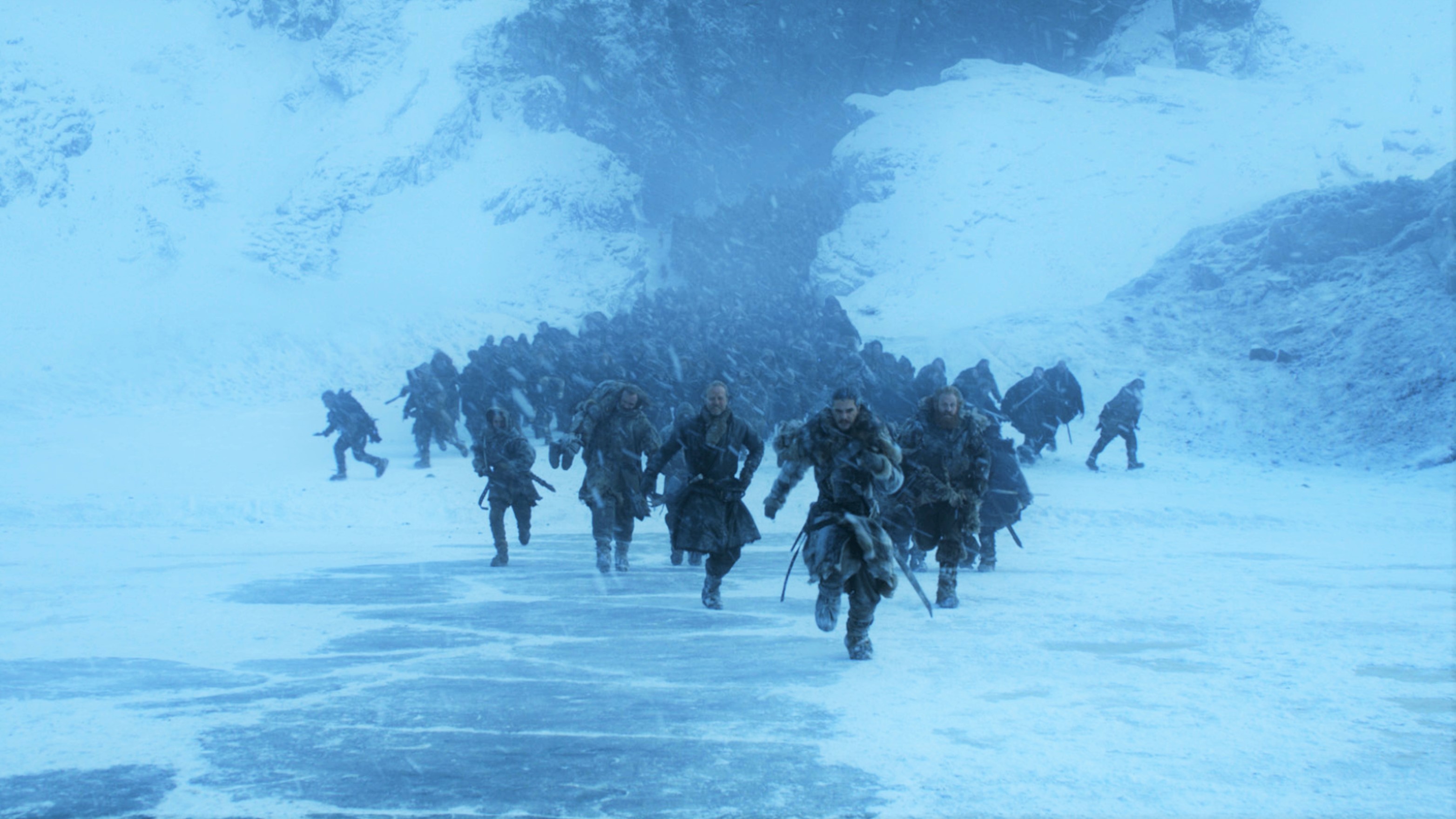
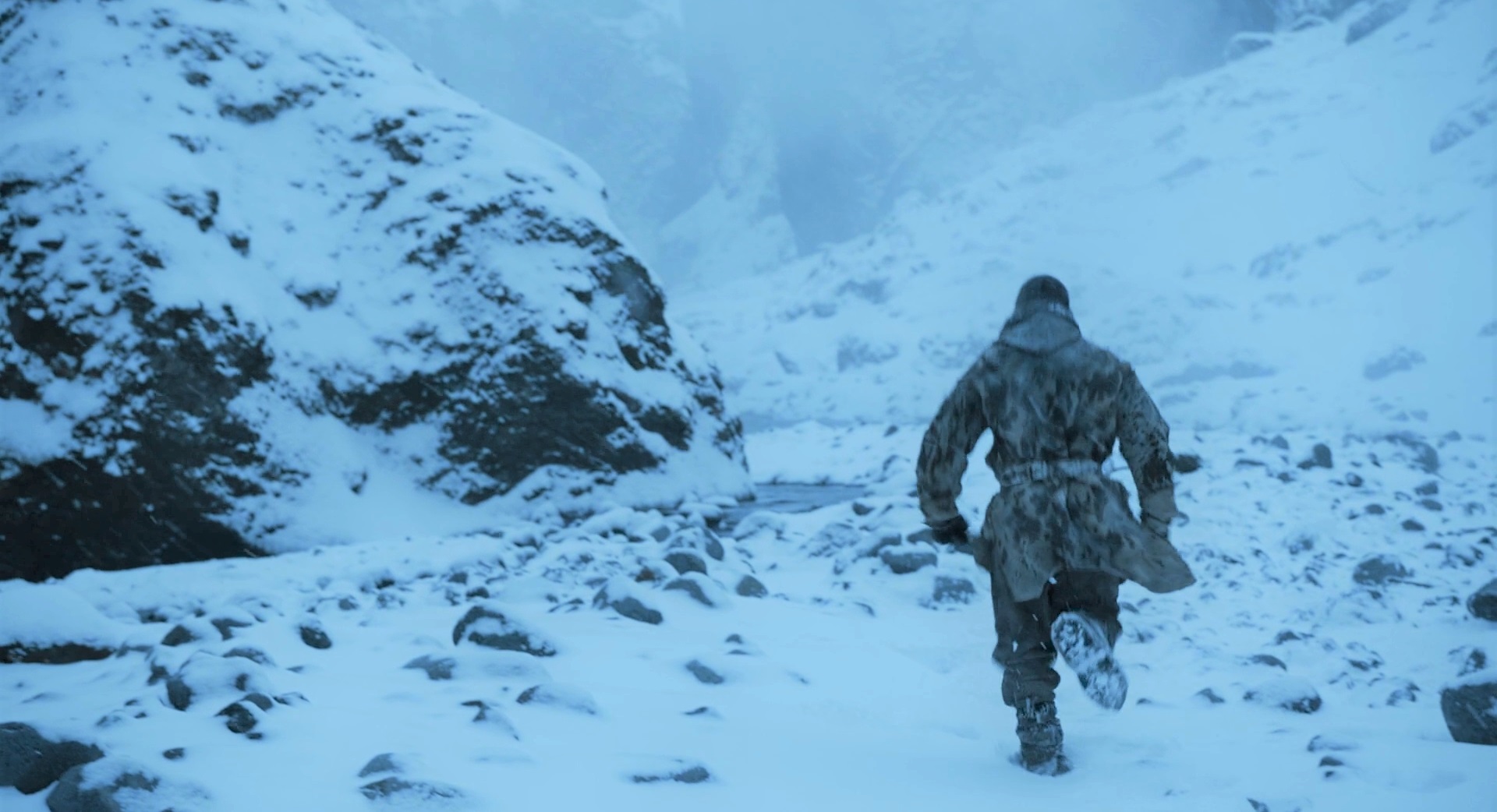

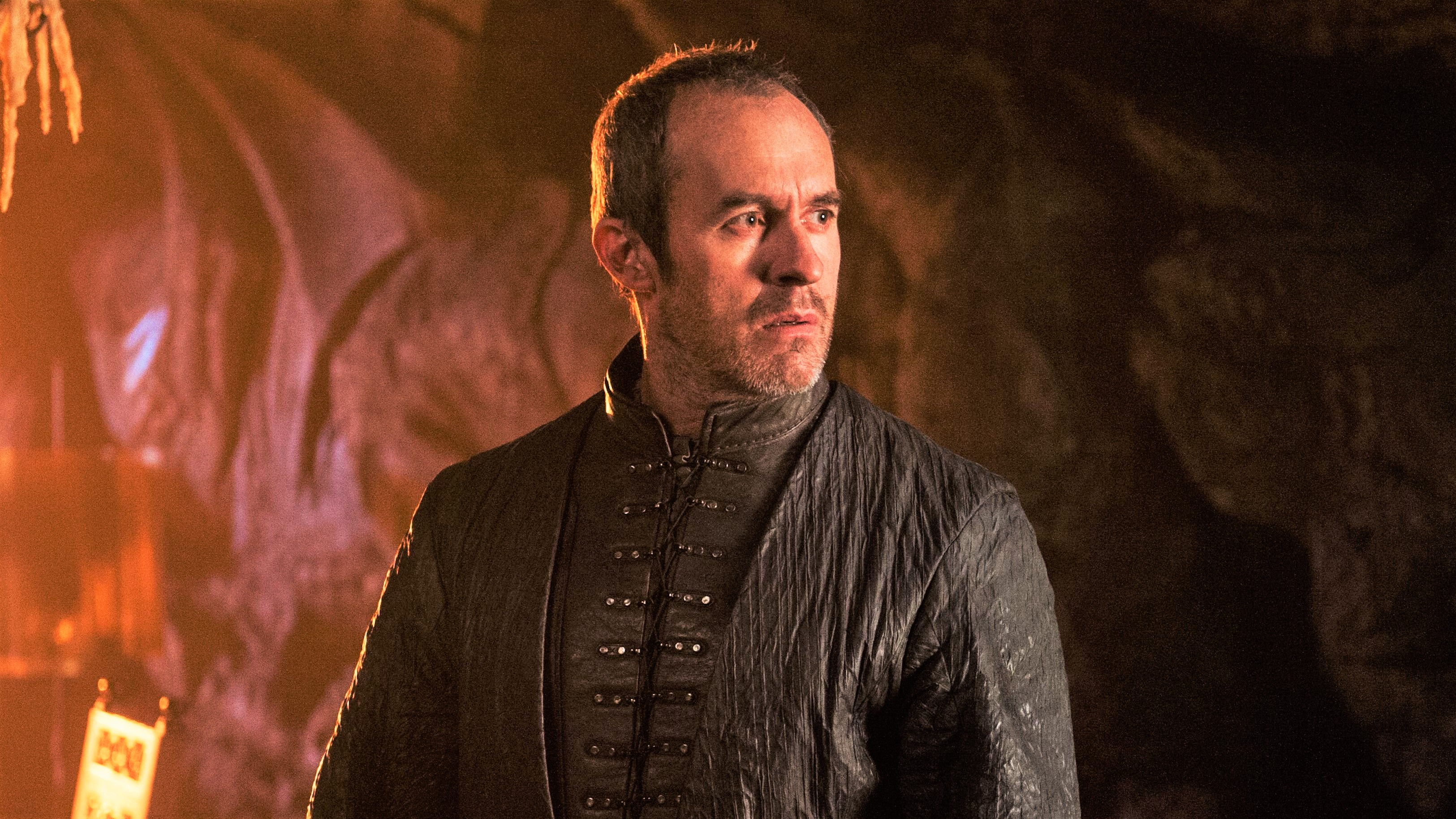
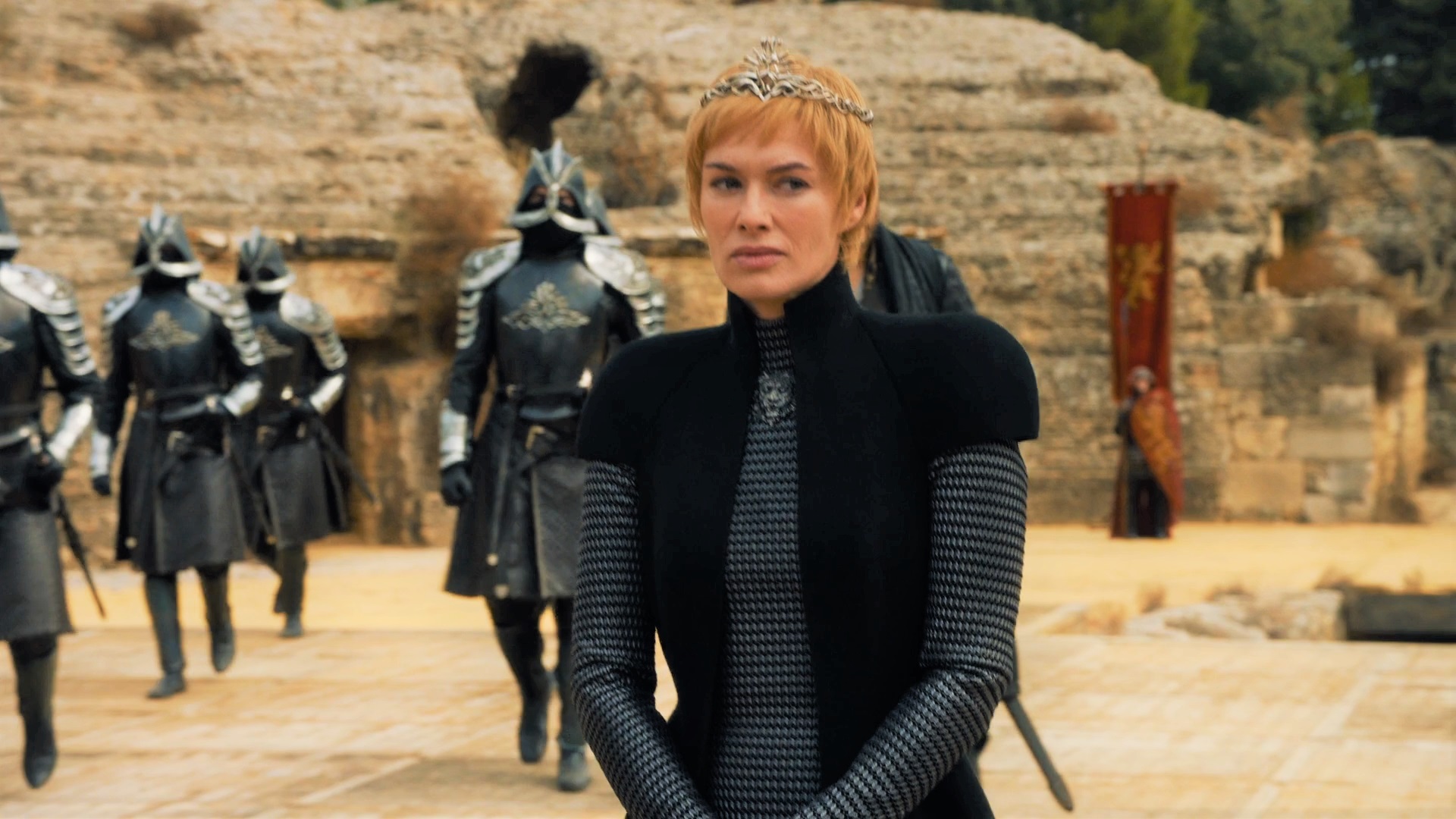

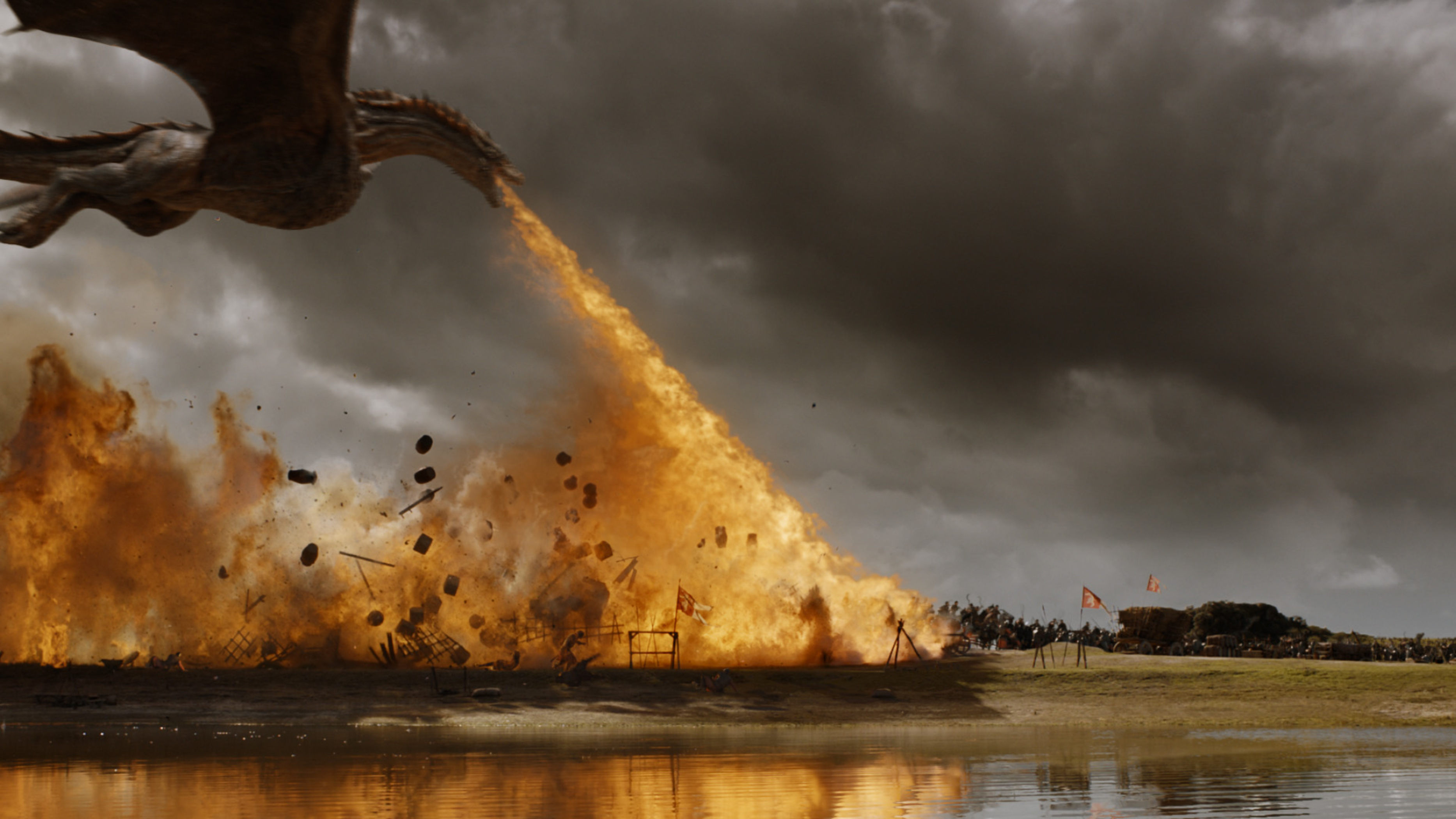
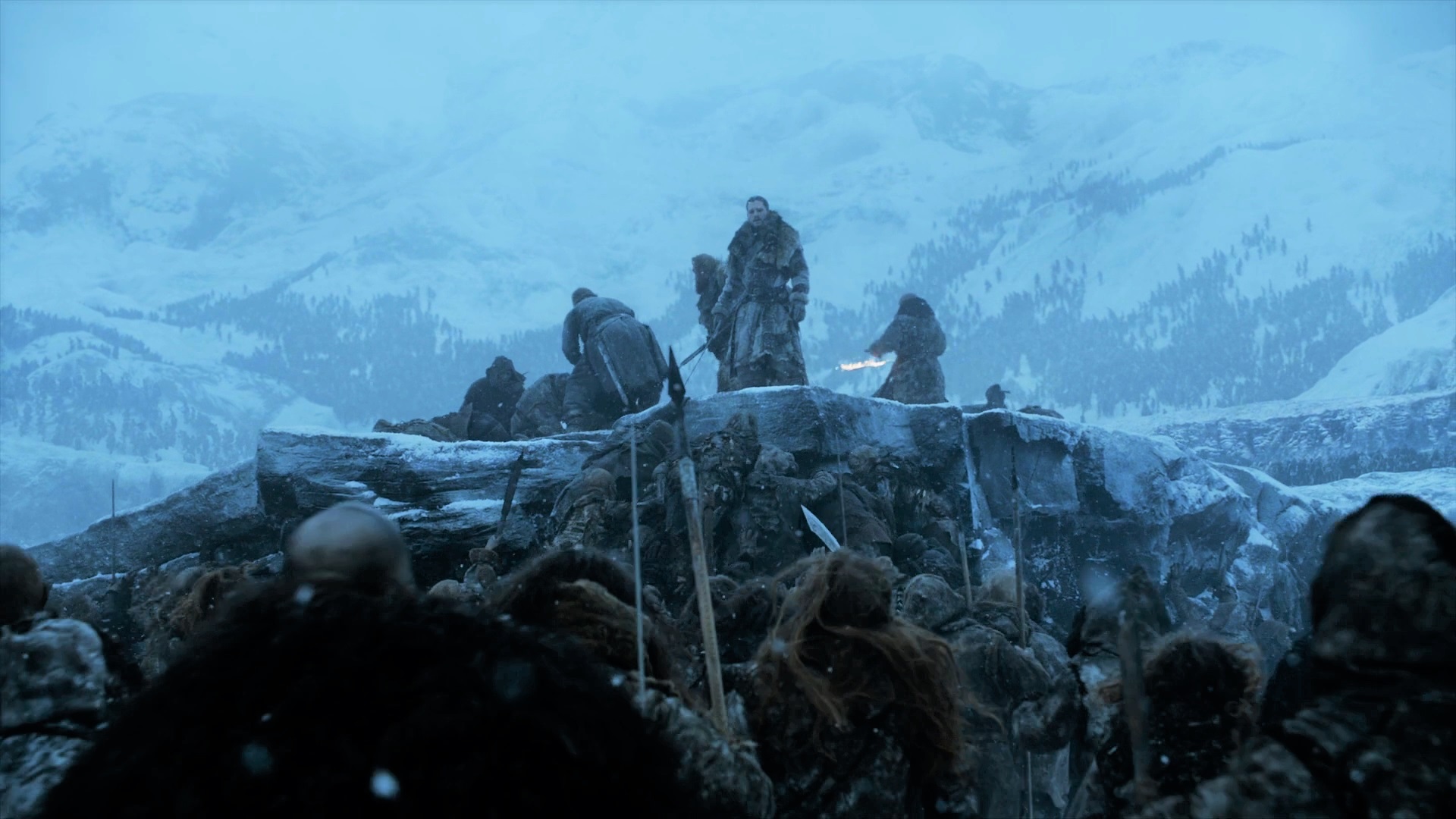
No comments:
Post a Comment